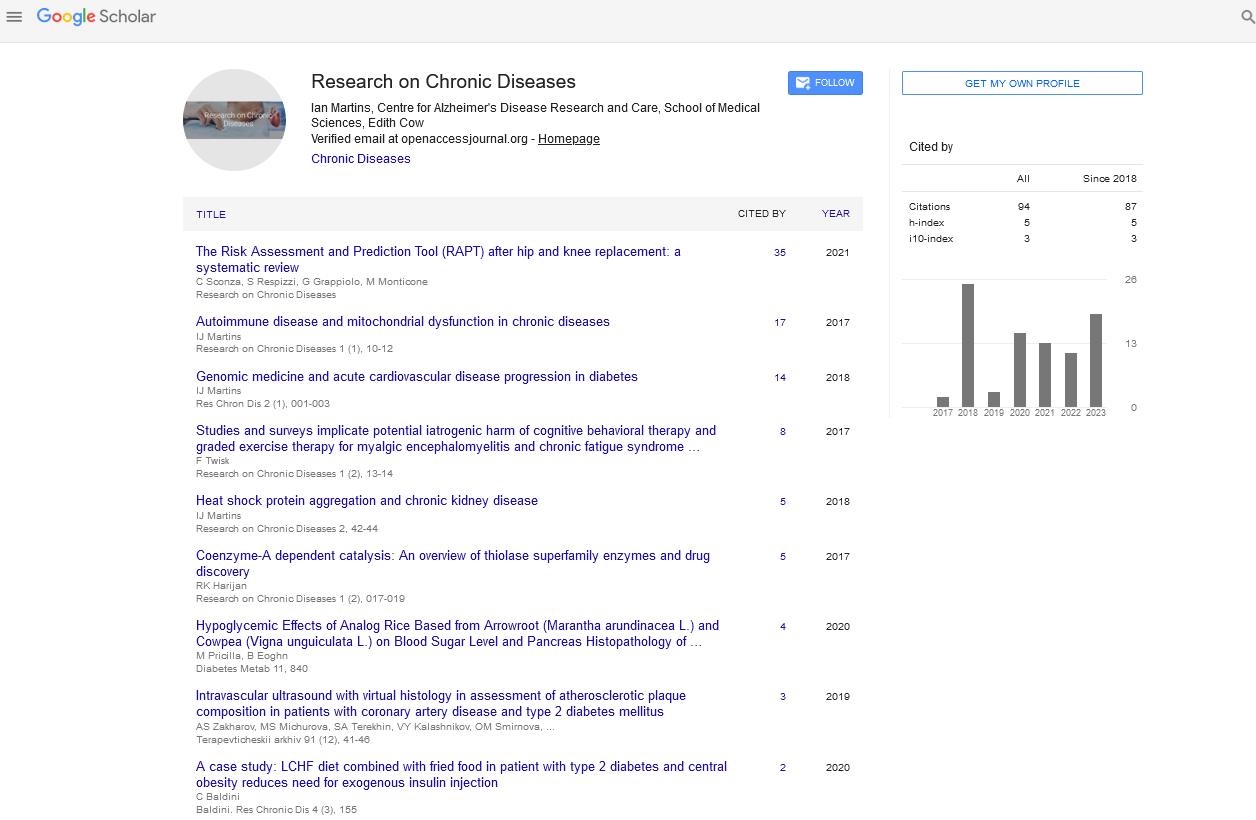Perspective - Research on Chronic Diseases (2024) Volume 8, Issue 3
Navigating the Landscape of Chronic Diseases: Understanding, Managing, and Thriving
- Corresponding Author:
- Friday Ogbetere
Department of Pathophysiology,
University of Istanbul,
Istanbul,
Turkey
E-mail: fridayemeak@gmail.com
Received: 04-May-2024, Manuscript No. oarcd-24-134031; Editor assigned: 08-May-2024, PreQC No. oarcd-24-134031 (PQ); Reviewed: 22-May-2024, QC No. oarcd-24-134031; Revised: 07-Jun-2024, Manuscript No. oarcd-24-134031 (R); Published: 14-Jun-2024, DOI: 10.37532/OARCD.2024.8(3).180-181
Introduction
Chronic diseases have become the silent epidemic of our times, stealthily infiltrating lives and communities, impacting millions globally. While infectious diseases often grab the headlines, chronic diseases linger in the shadows, quietly eroding health and well-being. However, their prevalence, complexity and long-term effects make them a formidable challenge for healthcare systems worldwide. In this article, we embark on a journey to unravel the intricate tapestry of chronic diseases, exploring their nuances, management strategies and the profound impact they have on individuals and societies.
Description
Understanding chronic diseases
Chronic diseases encompass a broad spectrum of conditions characterized by their prolonged duration and persistent effects on physical and mental health. Unlike acute illnesses that often resolve with time or treatment, chronic diseases persist over the long term, exerting a significant burden on individuals, families and healthcare systems. Examples include diabetes, cardiovascular diseases, chronic respiratory conditions, cancer and mental health disorders such as depression and anxiety.
One of the defining features of chronic diseases is their multifactorial nature, involving a complex interplay of genetic predisposition, environmental factors, lifestyle choices and socio-economic determinants. For instance, while genetics may predispose an individual to diabetes, lifestyle factors such as diet, physical activity and stress levels play a crucial role in its development and progression. Similarly, socio-economic factors such as access to healthcare, education and socioeconomic status can influence the prevalence and management of chronic diseases within populations.
Manifestations chronic diseases
The management of chronic diseases requires a comprehensive and multidisciplinary approach that addresses both the underlying biological mechanisms and the broader socio-economic determinants. This encompasses preventive measures, early detection, effective treatment modalities and ongoing management strategies aimed at reducing symptoms, preventing complications and improving quality of life.
Preventive measures play a pivotal role in combating chronic diseases by targeting modifiable risk factors such as smoking, unhealthy diet, physical inactivity and excessive alcohol consumption. Public health initiatives aimed at promoting healthy lifestyles, raising awareness and facilitating early screening and detection can help mitigate the burden of chronic diseases at a population level.
Early detection and timely intervention are critical in the management of chronic diseases, as they enable healthcare providers to implement targeted interventions and prevent disease progression. Screening programs, diagnostic tests, and risk assessment tools facilitate early identification of individuals at risk or in the early stages of disease, allowing for timely initiation of treatment and lifestyle modifications.
Treatment modalities for chronic diseases vary depending on the specific condition, severity and individual patient factors. They may include pharmacological interventions, lifestyle modifications, surgical procedures, rehabilitation programs and psychosocial support services. Personalized medicine approaches, guided by advances in genomics, molecular biology and digital health technologies, are increasingly shaping the landscape of chronic disease management, enabling tailored interventions based on individual genetic makeup, biomarker profiles and treatment responses.
In addition to medical interventions, holistic approaches that address the broader determinants of health are essential for effective chronic disease management. This includes access to affordable healthcare services, social support networks, mental health services and community resources that empower individuals to make informed decisions and actively participate in their care.
Thriving with chronic diseases
Living with a chronic disease can be challenging, demanding resilience, adaptation and a proactive approach to self-care. However, it is also an opportunity for personal growth, empowerment and a renewed appreciation for life’s precious moments. Adopting a positive mindset, cultivating self-awareness and building a support network of healthcare professionals, family members and peers can help individuals navigate the ups and downs of their health journey with resilience and grace.
Self-management strategies such as regular exercise, healthy eating, stress management techniques and adherence to prescribed medications are fundamental pillars of chronic disease management. Empowering individuals with the knowledge, skills and resources to take charge of their health fosters a sense of autonomy, control and empowerment, enhancing their overall well-being and quality of life.
Furthermore, embracing a holistic approach to health that encompasses physical, mental, emotional and spiritual dimensions can foster a sense of wholeness and resilience in the face of chronic illness. Mind-body practices such as mindfulness meditation, yoga, tai chi and expressive arts therapies offer valuable tools for managing stress, coping with symptoms and cultivating inner peace and resilience.
Conclusion
Chronic diseases represent a formidable challenge for individuals, healthcare systems and societies at large, requiring a multifaceted approach that addresses their complex etiology, management and impact. By understanding the underlying mechanisms, implementing preventive measures and embracing holistic approaches to health and well-being, we can empower individuals to thrive in the face of chronic illness, reclaiming their health and vitality one step at a time. Together, we can transform the narrative of chronic diseases from one of despair and resignation to resilience, hope and possibility.
